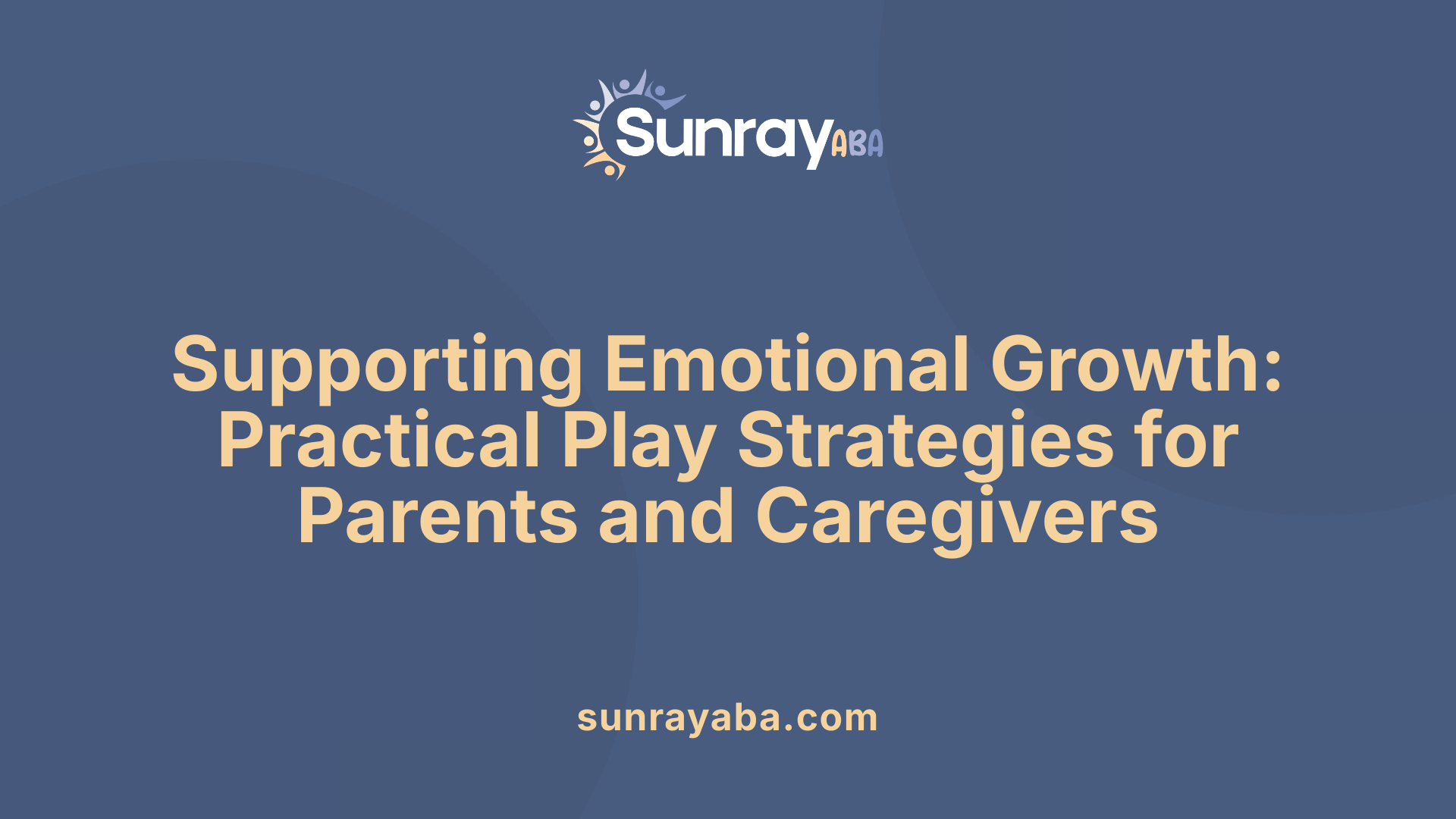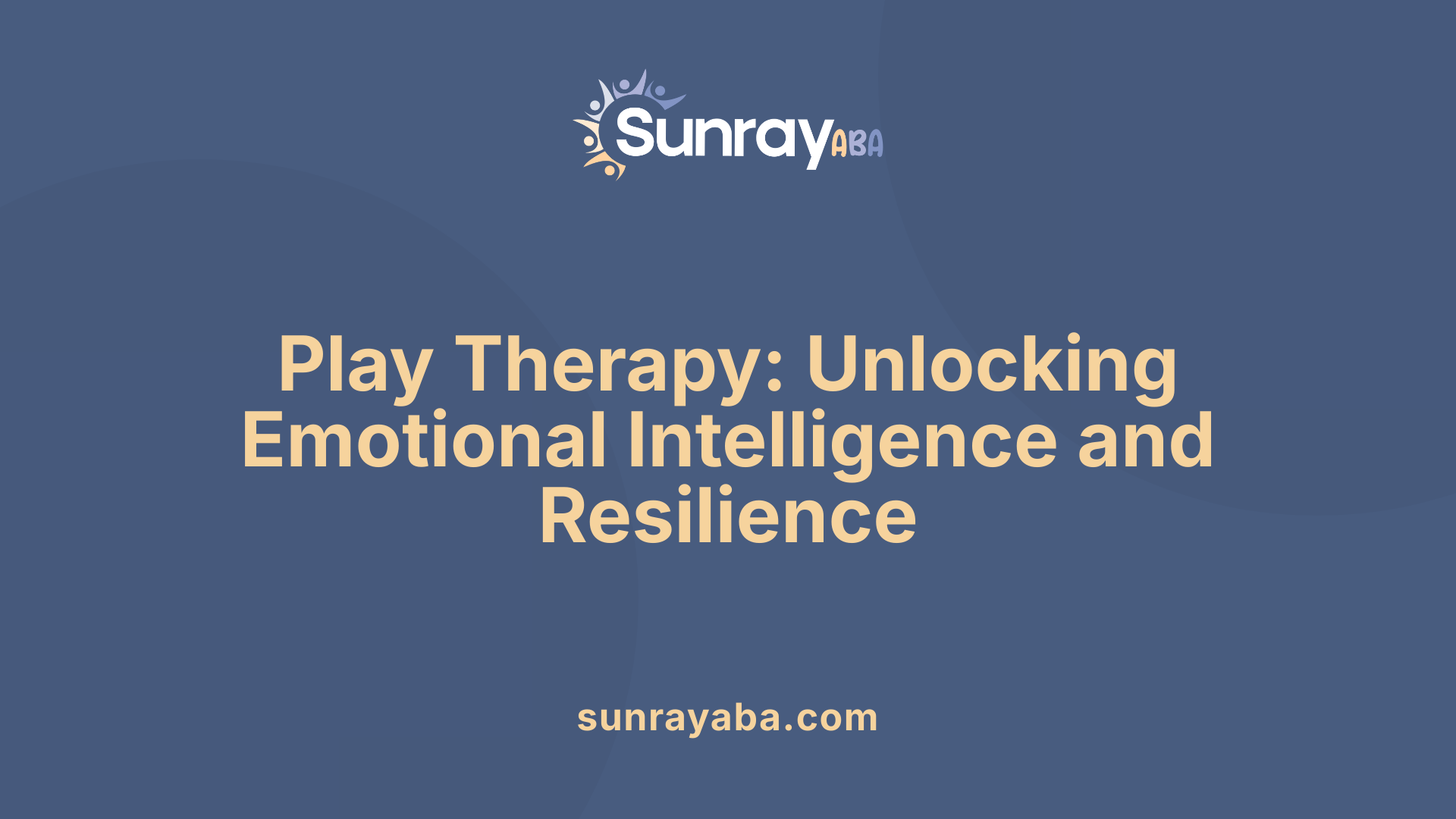Helping Kids Develop Emotional Awareness Through Play

The Transformative Power of Play in Emotional Development
Play is an innate and fundamental aspect of childhood that serves as a vital tool for fostering emotional awareness, self-regulation, and social understanding. From unstructured free play to guided activities and therapeutic interventions, a variety of play-based approaches support children’s emotional growth. This article explores how play contributes to emotional skills, the importance of play-based learning, effective strategies for caregivers, and the developmental milestones that can be facilitated through playful engagement.
The Role of Play in Building Core Emotional Skills

How does play contribute to children’s emotional skills overall?
Play is fundamental in helping children develop emotional intelligence. It provides a safe and stimulating environment where children can freely express their feelings, explore different emotions, and learn how to regulate them. During play, children learn to recognize their own emotions as well as those of others, which boosts empathy and social understanding.
Through activities like role-playing, art, and outdoor games, children practice managing intense feelings such as frustration, anger, or sadness. These experiences build emotional resilience and encourage self-awareness. When children interact with peers during play, they develop important social skills like cooperation, negotiation, and perspective-taking.
Overall, play serves as a natural learning space for emotional growth. It helps children understand themselves better, communicate their emotions more effectively, and navigate the social world with confidence. The process of play nurtures emotional regulation, empathy, and social competence, which are vital for long-term well-being and success.
Why is play-based learning important for social-emotional development?
Play-based learning is crucial because it mimics real-life situations that require emotional and social skills. When children engage in unstructured and child-led play, they learn to share, take turns, and resolve conflicts — all of which are essential for emotional maturity.
This type of learning allows children to practice managing their emotions in a natural, low-stress environment. For example, when a toy is taken or a game is not going as planned, children encounter challenges that require emotional regulation, patience, and problem-solving.
Play also encourages empathy by giving children opportunities to see things from others' perspectives. Cooperative activities teach them how to build relationships and communicate effectively.
When adults guide and participate in play, they can reinforce social-emotional skills and help children develop confidence and resilience. This dynamic process fosters holistic development, bridging emotional growth with cognitive and physical skills.
How does play promote emotional regulation, empathy, and social skills?
Play supports emotional regulation by allowing children to experience and manage a range of feelings in a supported environment. Activities like mindfulness games, calming crafts, or pretend scenarios help children identify and control their emotions.
Empathy develops through role-playing and storytelling, where children imagine others' feelings and reactions. When children pretend to be different characters, they practice understanding diverse perspectives, which enhances social awareness.
Social skills such as cooperation and conflict resolution are naturally cultivated during group play. Turn-taking, sharing, and negotiating are learned through interactive activities like Simon Says, Freeze Tag, or collaborative art projects.
Structured and unstructured play both contribute to these skills, especially when adults facilitate positive interactions and model appropriate emotional responses. Over time, children become better equipped to navigate complex social and emotional situations, both in childhood and later in life.
Why is creating safe environments important for emotional exploration during play?
Providing safe spaces for play is essential for children to explore emotions openly without fear of judgment or harm. When children feel secure, they are more willing to take risks, express difficult feelings, and experiment with new social roles.
Safe environments—whether at home, school, or playgrounds—allow children to relax, be themselves, and learn from their experiences. This includes having age-appropriate equipment, supportive adult supervision, and an inclusive atmosphere that respects diverse needs.
For children with neurodiversity or additional needs, following their lead and matching activities to their developmental level further supports emotional learning. Tailored play experiences can help these children develop self-awareness and self-regulation skills effectively.
Creating such environments encourages genuine emotional exploration, making play a powerful tool for socio-emotional development. Children are more likely to practice emotional skills, resolve conflicts healthily, and build resilience when they feel safe and supported.
| Aspect | Focus | Examples |
|---|---|---|
| Contribution of Play | Emotional awareness, resilience, self-expression | Role-playing, outdoor games, art activities |
| Promotion of Skills | Emotional regulation, empathy, social skills | Turn-taking, conflict resolution, storytelling |
| Safe Environments | Support, inclusivity, tailored needs | Childproofed spaces, adult facilitation, adaptive activities |
| Types of Play | Unstructured and structured play | Pretend, physical, messy, cooperative |
| Tools and Resources | Emotional literacy and regulation | Feelings Wheel, emotion cards, mindfulness games |
By integrating playful activities into daily routines and environments, caregivers and educators can significantly enhance children’s emotional intelligence. Play doesn’t just entertain; it equips children with vital life skills for emotional well-being and healthy relationships.
Strategies and Activities to Foster Emotional Growth
What are effective strategies and activities to support children's emotional growth through play?
Supporting children's emotional development through play involves a variety of creative, social, and structured activities that provide safe outlets for emotion and social interaction. Imaginative and role-playing games—such as pretending to be different characters, mimicking emotions, or enacting everyday scenarios—allow children to explore and express their feelings. These activities help develop empathy and understanding of others.
In addition, social games like peek-a-boo, turn-taking, and conflict resolution activities serve as early tools for social-emotional skill building. Playing with toys designed for pretend scenarios—dolls, stuffed animals, or action figures—encourages children to practice empathy, cooperation, and problem-solving.
Creative arts, including drawing faces to express emotions, music, dance, and storytelling, provide nonverbal ways for children to process feelings. These methods help children recognize and manage strong emotions like anger, fear, or excitement in a relaxed setting.
Creating a safe, predictable environment is essential. Responsive caregiving, routine, and culturally sensitive practices foster emotional security. Mindfulness exercises such as deep breathing, guided imagery, and sensory exploration teach children to stay calm during emotional upheavals.
Caregivers' active participation—modeling caring behaviors, providing encouragement, and engaging in shared play—further promotes emotional resilience. Collaborating with families ensures consistency, extends emotional learning beyond formal settings, and reinforces positive behaviors.
Overall, combining these strategies creates a supportive framework where children can learn to identify, understand, and regulate their emotions effectively.
How can early childhood resources support emotional development through play?
Resources designed for early childhood can significantly bolster emotional understanding and regulation. Safe, engaging environments with accessible toys invite children to explore their feelings creatively and comfortably. Open-ended art supplies, musical instruments, and storytelling tools encourage expression beyond words, fostering emotional awareness.
Caregivers and educators can leverage these resources by actively participating in play, modeling empathy, and demonstrating healthy ways to express emotions. Through cooperative games and role-playing activities, children learn essential social skills, such as sharing, negotiating, and understanding different perspectives.
Specialized programs like play therapy, art therapy, and mindfulness activities tailored for young children enhance emotional resilience and self-regulation. For instance, introducing tools like feelings charts, emotion cards, and metaphors (e.g., weather symbols for emotions) makes recognizing and naming feelings more accessible.
Providing consistent routines, predictable interactions, and culturally appropriate practices creates a sense of safety, which is crucial for emotional stability. Early childhood developments are supported best when resources are coupled with responsive caregiving, enabling children to build trust and confidence in managing their emotions.
In essence, thoughtfully designed resources, combined with adult facilitation, create an environment where children can confidently navigate their emotional worlds, laying a foundation for lifelong emotional well-being.
Developmental Milestones Facilitated by Play

What developmental milestones related to emotional awareness can be facilitated by play?
Play is a fundamental activity that supports children’s growth in emotional awareness and social skills. Engaging in different types of play—such as pretend, role-playing, and social interactions—gives children the chance to recognize, label, and express their feelings. During these activities, children learn to identify emotions like happiness, anger, fear, or envy, which are essential milestones in emotional development.
Through unstructured play, children practice understanding others’ feelings by observing and responding to peers’ expressions and actions. For example, they might notice when a friend feels sad and respond with comfort, fostering empathy. Such interactions promote social competencies like sharing, taking turns, and resolving conflicts.
Play also helps children develop their ability to regulate emotions by practicing calming techniques, managing frustration, or handling disappointment in a safe environment. Activities like calming bottles or mindfulness games teach children how to self-soothe and stay focused.
Imaginative and social play are particularly effective in helping children differentiate between emotions like embarrassment, shame, and pride. They explore these feelings by acting out scenarios, which boosts their self-awareness and understanding of others’ perspectives.
Furthermore, children begin to develop their self-conscious emotions—such as guilt or pride—by reflecting on their behaviors during role play. This self-reflection is a sign of advancing emotional maturity.
In summary, playful experiences serve as vital milestones in early development, laying the groundwork for emotional regulation, empathy, and social competence. These key abilities are crucial for forming healthy relationships and handling social challenges as children grow.
Enhancing Emotional Awareness and Empathy through Pretend Play

How does pretend play contribute to emotional awareness and empathy?
Pretend play plays a vital role in helping children develop emotional awareness and empathic skills. By immersing themselves in imaginative scenarios, children are encouraged to explore and express a wide range of emotions in a safe environment. For example, acting out roles such as a doctor or a parent allows children to experience feelings like responsibility, caring, or concern.
Moreover, pretend play provides an excellent platform for children to understand others' emotions by observing and mimicking social interactions and reactions. When children pretend to comfort a toy or a peer, they practice empathy by considering what someone else might be feeling.
Children learn to see the world from different perspectives through role-playing and storytelling, which are core elements of imaginative play. This perspective-taking enhances their ability to understand and respect others' viewpoints in real-life social situations.
Additionally, engaging in pretend scenarios helps children practice regulating their own emotions. For instance, acting out a frustrating situation, such as losing a game, teaches them to manage feelings like anger or disappointment. As they navigate these scenarios, they develop better control over their emotional responses.
Research shows that children actively involved in pretend play show higher levels of emotion comprehension, prosocial behavior, and self-regulation skills. These benefits are linked to the natural and enjoyable context that pretend play provides, making learning about emotions engaging rather than burdensome.
Overall, pretend play is a fundamental activity that nurtures empathy, emotional regulation, and social understanding. Its role in early childhood development helps prepare children for more complex social interactions and emotional challenges later in life.
How pretend play fosters empathy, perspective-taking, and emotional regulation
Engaging in pretend play allows children to step into roles and scenarios that simulate real-life social settings. This immersive experience helps them recognize and interpret emotional cues in others.
For example, when children play house, they learn about caregiving and responsibility. They might imitate feelings of happiness, frustration, or worry, enhancing their ability to understand these emotions in others.
Role-playing encourages children to imagine how someone else might feel and respond appropriately, which is a cornerstone of empathy. It’s common for children to pretend to be different characters, exploring various emotional states and reactions.
Furthermore, pretend play serves as a rehearsal space for emotional regulation. When faced with conflicts or difficult feelings during play, children learn to manage their reactions by negotiating, calming themselves, or expressing feelings constructively.
Research indicates that children who engage in diverse pretend scenarios develop stronger emotional awareness and are more adept at regulating their feelings. They become better equipped to handle challenging social situations with confidence.
Benefits of role-playing for emotional understanding
Role-playing offers numerous advantages in fostering emotional intelligence. It provides a tangible way for children to connect feelings with behaviors, understand social norms, and develop compassion.
By acting out scenarios like sharing toys or resolving disputes, children learn essential skills such as cooperation, negotiation, and conflict resolution. These scenarios also enable them to recognize emotional signs like frustration, joy, or embarrassment.
Imaginative role-playing enhances children’s vocabulary related to emotions, improving their ability to articulate feelings accurately and effectively.
Parents and educators can facilitate role-play by providing props and setting up scenarios that align with children’s interests. This encourages sustained engagement and deepens emotional learning.
In sum, pretend play is a dynamic and enjoyable strategy to develop emotional understanding and empathy amongst children, equipping them with skills vital for healthy social interactions and emotional resilience.
Practical Tips for Parents and Caregivers

What are some practical tips for parents and caregivers to support emotional development through play?
Supporting children’s emotional growth through play is both vital and enjoyable. Parents and caregivers can adopt several strategies that encourage emotional awareness, regulation, and social skills development.
First, actively participating in children’s play is essential. Engaging in pretend scenarios, reading stories with emotional themes, and using role-plays or puppets allow children to explore feelings in a safe environment. These activities train children to recognize, name, and express their emotions, fostering empathy and understanding others.
Sensory play, art projects, and movement-based activities such as yoga or mindfulness exercises help children manage big emotions like anger, fear, or excitement. These tools support self-regulation and emotional resilience.
Creating a nurturing and secure environment is fundamental. This includes providing safe spaces for exploration, ensuring accessible play resources, and maintaining a routine that incorporates playful learning moments.
Parents should also model emotional language and regulation. For example, verbalizing feelings during everyday situations (“I feel happy when we play together”) demonstrates emotional literacy and sets a positive example.
Incorporating both structured and unstructured play enhances social skills. Activities like turn-taking games, collaborative projects, and problem-solving tasks teach cooperation, patience, and conflict resolution.
Finally, turning everyday moments into opportunities for emotional learning can be very effective. During meals, walks, or bedtime, discussing feelings, using emotion words, and validating children's emotions deepen their understanding and self-awareness.
In summary, intentional engagement in play, creating a warm environment, and actively teaching emotional vocabulary and regulation are practical steps to nurture well-rounded emotional development in children.
The Role of Play Therapy in Emotional Intelligence Enhancement

What is the role of play therapy in enhancing emotional intelligence in children?
Play therapy serves as a crucial approach in nurturing emotional intelligence among children by leveraging the natural way children communicate—through play. It offers a safe, supportive environment where children can freely express, explore, and understand their feelings through symbolic and social activities. This environment encourages children to identify their emotions, understand others' perspectives, and develop healthier ways to manage their feelings.
In practice, play therapy uses a variety of tools such as toys, puppets, role-playing scenarios, storytelling, and creative arts. These activities mirror real-life situations, allowing children to rehearse responses, improve empathy, and enhance social skills like cooperation, effective communication, and conflict resolution. For example, children might act out a difficult situation with a puppet or engage in role-play to understand different perspectives, which promotes emotional awareness and social understanding.
Beyond skill development, play therapy also assists children in processing trauma, stress, and complex emotional experiences. Through symbolic play, children can work through fears, anxieties, and past experiences in a non-threatening context, which supports emotional resilience and overall mental health.
The benefits extend to fostering self-regulation—helping children recognize and manage their emotions—and building a foundation for responsible decision-making. As children navigate various scenarios and express themselves creatively, they gain confidence and a sense of mastery over their emotional world.
Additionally, involving toys, arts and crafts, and storytelling in therapy sessions creates engaging and accessible formats for children, especially those who might find verbal communication challenging. This multimodal approach allows children of diverse developmental levels and needs to participate actively in their emotional growth.
These mechanisms make play therapy an effective, evidence-based tool for enhancing emotional intelligence. It equips children with vital skills that contribute to healthier social interactions, better academic performance, and stronger resilience against life's stresses. As they grow, children who experience positive, supportive play therapy are more likely to develop lifelong emotional competence and well-being.
How play therapy helps children express and process feelings
Through the engaging and often imaginative activities employed in play therapy, children can express emotions that are difficult to articulate verbally. For instance, creating stories or dramatizing scenarios enables children to symbolize their experiences and feelings, making complex emotions more tangible and manageable.
The symbolic nature of play allows children to project their inner world, explore conflicts, and resolve internal struggles. This process can reduce emotional difficulties such as anxiety or anger, helping children develop healthier coping strategies.
The benefits of using toys, role-play, and storytelling in therapy
Toys, role-play, and storytelling are integral to play therapy because they foster empathy, perspective-taking, and social understanding. Toys like puppets and figurines serve as tools for children to act out feelings or situations, helping them articulate emotions non-verbally.
Role-playing immerses children in scenarios where they can rehearse responses to social and emotional challenges, improving their problem-solving abilities and emotional regulation.
Storytelling allows children to craft narratives around their experiences, promoting self-awareness and fostering a sense of mastery over their emotions.
The involvement of parents and caregivers in the therapy process
Parents and caregivers are vital partners in play therapy. Their involvement ensures continuity and reinforcement of emotional skills learned during sessions.
Therapists often include parents in the process, providing guidance on how to use play techniques at home, model emotional regulation, and support the child's developmental needs.
By participating actively, parents learn to better understand their child's emotional world, fostering a nurturing environment that promotes emotional health and resilience.
In summary, play therapy acts as a powerful method for developing emotional intelligence in children. Its use of symbolic, social, and creative activities helps children understand, express, and manage their emotions effectively. Through guided play, children build essential social skills and emotional resilience, laying the groundwork for healthier interactions and overall well-being.
Fostering Emotional Growth for a Brighter Future
Integrating play into everyday routines and specialized interventions offers a powerful pathway for nurturing children’s emotional skills. Whether through free play, guided activities, digital tools, or therapeutic approaches, supporting emotional awareness through play builds resilient, empathetic, and emotionally intelligent individuals. Encouraging caregivers, educators, and mental health professionals to utilize diverse play-based strategies can create nurturing environments that help children thrive socially and emotionally. Ultimately, fostering emotional growth through play lays a strong foundation for children’s well-being and success throughout their lives.
References
- Building Emotional-Intelligence Through Play - Generation Mindful
- 5 Ways To Develop Children's Social Emotional Skills Through Play
- How Children Use Play to Express Their Emotions
- Play to Learn Critical Social & Emotional Life Skills
- 5 Kid-Approved Tools to Build Emotional Awareness - Society of Care
- How Pretend Play Teaches Social-Emotional Development - Step2
- Preschoolers & emotions: play ideas | Raising Children Network
- How Does Play Affect A Child's Emotional Development?